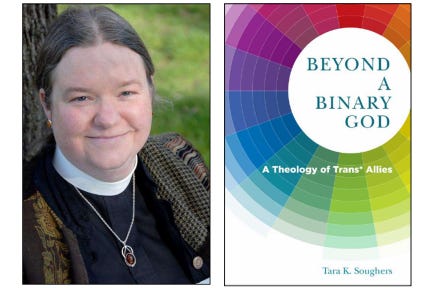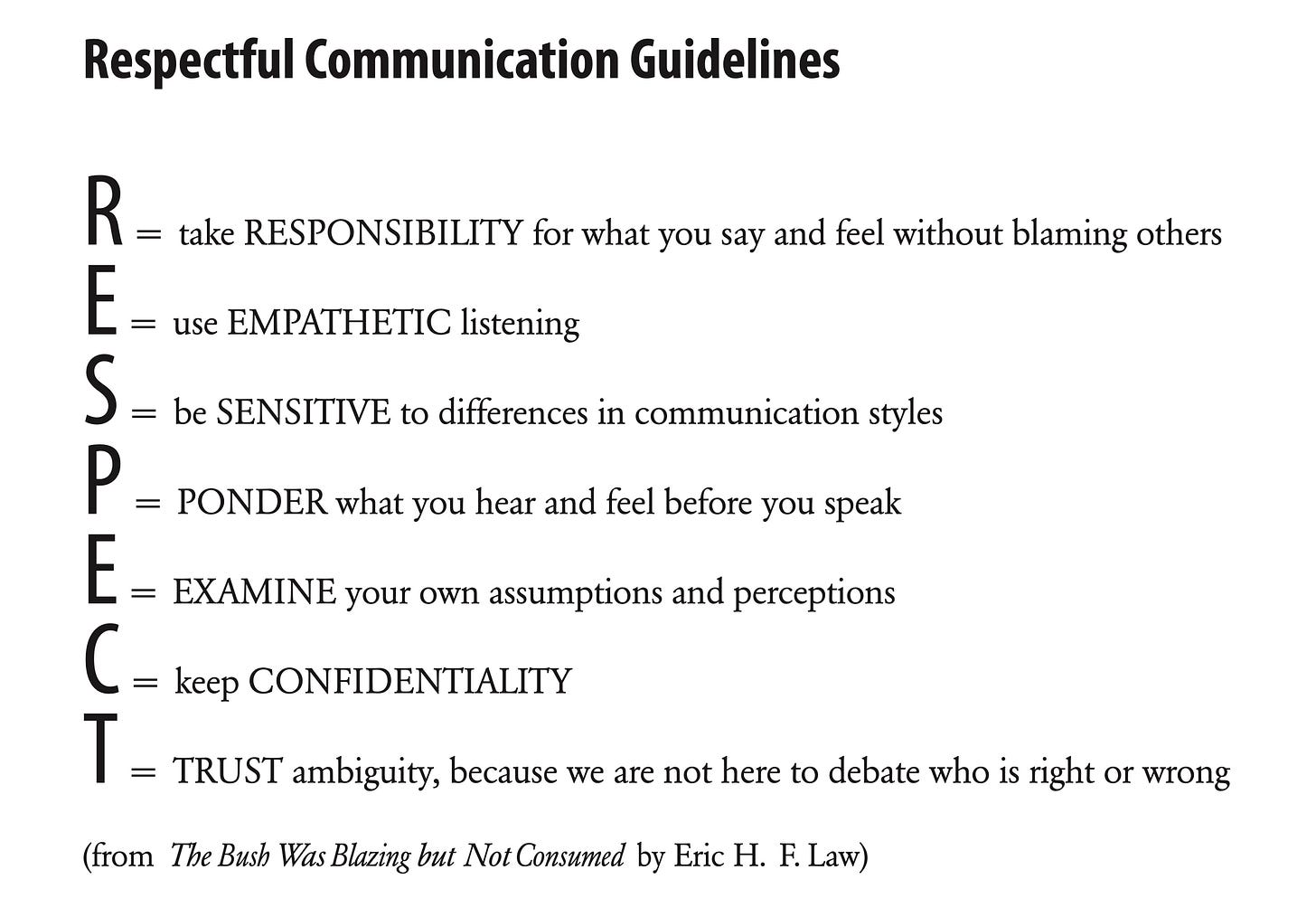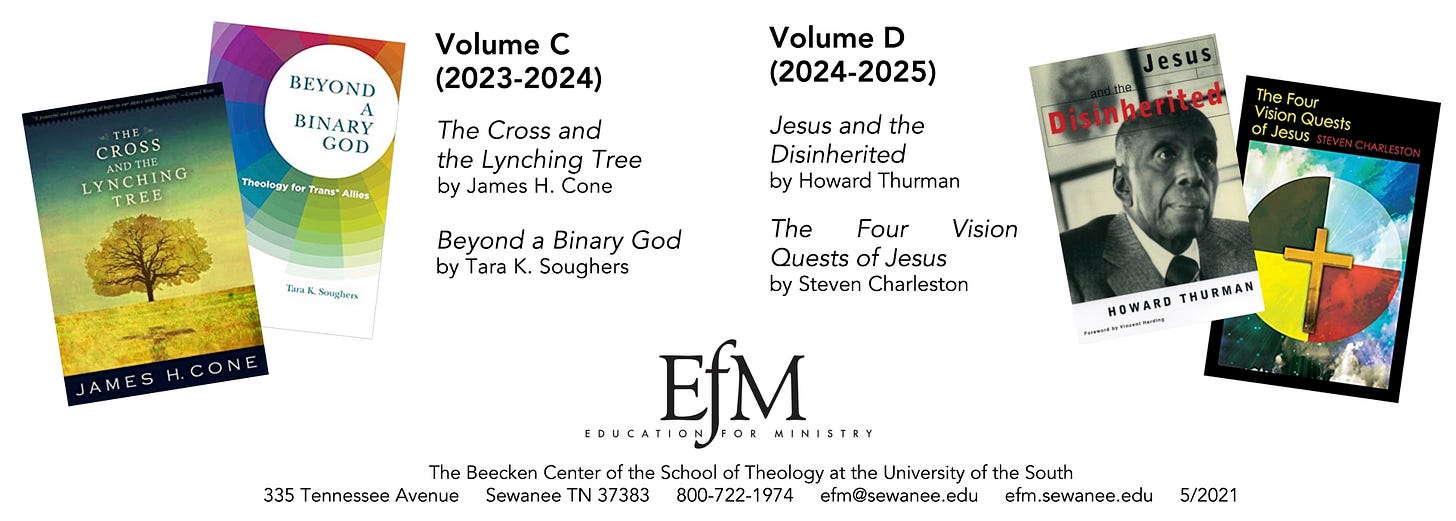The Challenge and Promise of Reading (and discussing) Difficult Books
Tara Soughers | EfM mentor and trainer
For the 2023 Summer Conference, outgoing Executive Director Karen Meridith asked me to do a workshop on dealing with difficult books. I was the obvious choice, being a long-time EfMer as well as the author of one of the potentially difficult books for the coming year. It proved to be a popular workshop among the participants, and newly installed Executive Director Kevin Goodman asked me to turn this into a blog.
Why Do We Read Challenging Books?
This question actually came up in the question and answer session of another workshop. A mentor was lamenting how books that tap into the political narratives swirling in our country divided her group and made it difficult for them to do their work. (I will point out that another mentor complained about having to read these books because his group already had read more in-depth studies than EfM was providing.) This is a reminder that EfM is and intends to be a community in which diversity is honored, but where the issues caused by that diversity are not politely ignored, but civilly and passionately engaged.
All theological reflection requires us to consider implications for our lives—that is, the necessary last step of every method. As Christians, we are called to consider how our theological beliefs affect all areas of our lives. Christian life is not meant to be confined simply to Sunday morning, but our faith is meant to have an impact on every area of our life. This includes how we exercise our political rights and civic responsibilities. If our faith has nothing to say about difficult issues, then it really isn’t very important, is it?
In EfM, we work hard to develop close and trusting communities where we can safely talk about things that are really important to us. That environment should also be one where we can talk about controversial topics, remembering that the point of our discussion is not to change each other’s mind or to win an argument, but to share our understandings in a way that allows each of us to decide the implications of our faith for ourselves. If we can’t talk about controversial topics in EfM, where can we do so? Where else do we have the opportunity to talk with people who may have a different opinion in an environment that provides a level of safety and security for the participants? This is a gift that I think EfM brings to the Church and the wider community.
Finally, EfM does not attempt to indoctrinate you into believing certain things. This is true of social issues as well as theology; instead, it shares the best scholarship that it can find, and asks the students to engage with that scholarship, in dialogue with the tradition, our culture, our own beliefs, and our experiences.
So why do we ask participants to read difficult books? We do that because we value diversity. Although the participants are not as diverse as we would like (being overwhelming white, middle-class and above, and over 45), we intentionally expose participants to a diversity of thought, bringing in perspectives that many in our group may not have been exposed to. Diversity is a challenge, for when we are really open to diverse perspectives, we may find that what we have always believed was true and obvious is not true and obvious to others, who may have had very different life experiences and come from different cultural backgrounds. We can see this as an attack (and many people do), or we can remind ourselves that all people are made in God’s image and likeness, and that we need other perspectives that may open our understanding of God and our faith more fully.
Resources within EfM
I will, at the end, tell you a little about the two books for the upcoming year and specific resources that I think might be helpful, but when I was first looking for resources, it was the traditional EfM resources that I first thought about, because EfM was made to help us look at challenging topics among groups where there is not a consensus.
The first resource is the practice of setting group norms. That is the place where we describe behavior that is appropriate and not appropriate. Setting group norms is the way in which we work to ensure that our groups will be safe places for people to share their concerns, their doubts, their fears, and their joys. This container is the primary reason that EfM can (and should) discuss difficult topics. The RESPECT guidelines, from the Kaleidoscope Institute, seem as if they could provide a starting point for groups to consider what they need to do this work.
One thing that the RESPECT guidelines emphasizes, which is a core value of EfM, is that we are not there to argue or to change anyone else’s mind. We are there to listen deeply to each other and the sources that we are studying. EfM is meant to be transforming, but the way in which each person will be transformed is unique. We are not trying to form a homogeneous group (which is happening more and more in cultural settings, as our divisions push us apart), for that would destroy the very diversity that we are seeking to celebrate and appreciate.
The second resource is the process of theological reflection. Our structured process of discussion moves us out of our ordinary responses and asks us to consider things from different points of view: our shared tradition, our culture, our own beliefs, and our own experiences of how God is at work in the world. It encourages us to keep different points of view in mind as we explore individually and as a group. It also attempts to provide safeguards to protect people from feeling intimidated by the points of view of others in the group.
Living in Community
All ministry begins in relationship, and at its best is reciprocal. As we each share our own stories and listen attentively to another’s stories, we come to know each other and the relationship deepens. Empathy deepens, and out of that empathy I minister to you even as you minister to me.
In EfM we begin the year by sharing a focused portion of our spiritual autobiographies. As we listen to one another we may find points of common experience and points at which our empathy is awakened. Sharing spiritual autobiographies forms a foundation on which we build relation- ships for working together in community through the year. As we continue to share stories of personal experience, name concerns and positions, offer varied expressions of worship, and acknowledge deep spiritual truths and longings, we deepen our connections to one another and actively look for ways to bridge differences that might otherwise separate us. EfM uses the Respectful Communication Guidelines and the Mutual Invitation process from the Kaleidoscope Institute as tools for learning to acknowledge and respect those differences. (From the Reading and Reflection Guide, Year C - “Core Practices in Education for Ministry,” pgs. 5-6)
The third resource consists of the exercises and the guidance in the RRG for the group while they are engaging with the Interlude Texts.
Interlude Texts for 2023-24
We are once again entering Year C, and finishing up Year B, whose theme was one of Living with Diversity. Because of this, we are asked to read and discuss books that detail theological responses (note that they are not either political or policy statements) based on two groups whose stories and understandings are often not widely heard in our mainstream culture. As many of our EfM groups are reasonably homogeneous, it is quite possible that your group may also not have heard these voices speak so honestly before, and their views and their experiences may not be consistent with the experiences of members of your group. Remember, the hope is not that everyone will end up believing the same thing, but for all of us to learn to sit with differences and to be able to listen to experiences that may make us uncomfortable. Listening to these voices may challenge our beliefs or the ways that we have been taught to think about God, theology, our country, how the world works, or what is right/wrong. We may have strong reactions to this material. However, if we are going to become a people who are open to diversity, we need to learn how to sit with discomfort, uncertainty, and challenge. Then we can use our other spiritual disciplines, such as prayer, discussion with a trusted group, spiritual direction, theological reflection, etc., to ponder how God might be calling us to respond. I think that the first thing is to encourage your groups to be as open as they can be, trusting that the Holy Spirit will be with us in these discussions. Jesus tells us, “I am the way, the truth, and the life.” If we are seeking truth, Jesus will be with us.
The two books for this coming year are: Beyond a Binary God: Toward a Theology for Trans* Allies, by Tara K. Soughers, and The Cross and the Lynching Tree, by James Cone.
In the first book, I have written the book that I wish had been available when my son first told us he was transgender. It raises issues of gender, gender roles, and gender expectations. What does it mean that we are made in the image and likeness of God, and how does the varied experience of gender challenge or support our traditional understandings of God?
Below is a link to a video that is fairly short and might be helpful for people who have had little experience with gender diversity. It focuses on terminology, which can be confusing for people. It is done in a light-hearted way by a group of young adults.
The second book is written by James Cone, one of the foremost Black theologians. He reflects upon the way in which lynching in our country has strong echoes of the experience of Jesus on the cross. It is an unsettling book with graphic descriptions of lynching practices. It is likely to raise issues of white supremacy and systemic racism. The video I am recommending for the Cone book is about white supremacy and the ways that racism is embedded in our culture, and it is significantly longer. In this country, we seem to have a real problem with having honest conversations about race, in part because most white people have been taught that racism is about being a “bad person,” and none of us wants to be seen as a bad person. That leads us to deny the real destructive experiences that people of color experience daily in our country. This video challenges the idea that racism is only explicitly bad and hateful acts done intentionally. Racism is more hidden and subversive than that, and Robin DiAngelo has spent her career helping White people to understand that their involvement in racism does not make them bad people. THIS VIDEO was prepared for use in the United Methodist Church. It is quite long, but it may be necessary to help the people in your group be able to talk about the issues that Cone raises.




